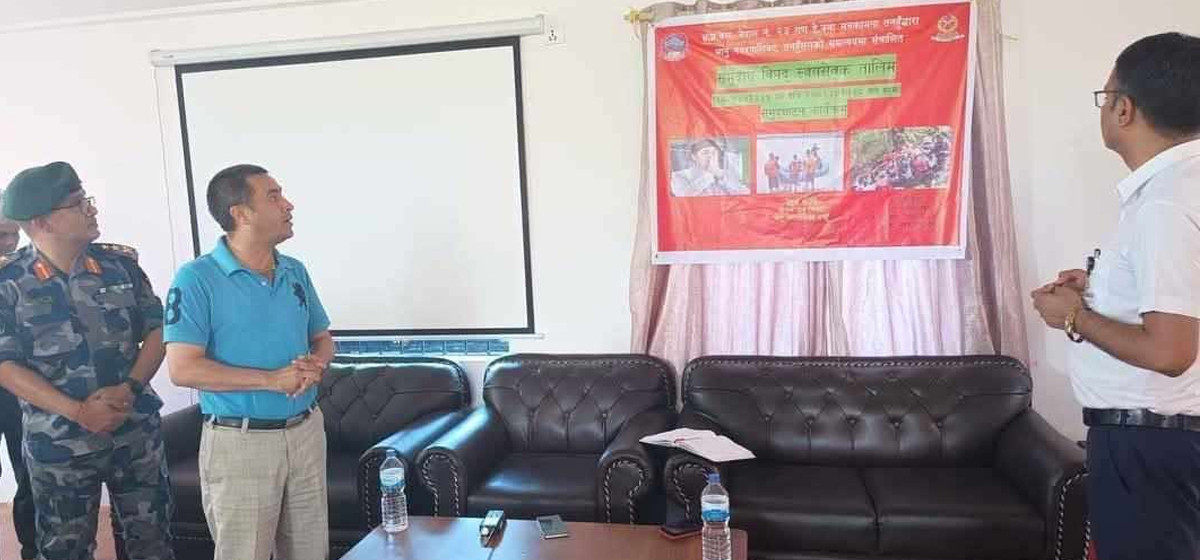Diplomacy has an emergency and humanitarian dimension. But with increasing internal conflicts, terrorism, natural disasters, effects of climate change and growing incidents of pandemics, disaster prevention, mitigation, management, reconstruction and rehabilitation have acquired a new place in diplomacy. The UN has a large humanitarian department and major powers also have humanitarian and disaster prevention/management sections in their foreign offices.
Like people around the world, Nepalis too are victims of manmade disasters. But once in a while Mother Nature's fury adds to their pains. The recent mega-earthquake is one such example. The death toll has crossed 7,000 and it is certain to increase; number of injured and sick will surely cross 20,000. Physical destruction is unprecedented.
The generally pleasant spring season is instead imposing unseasonal rain on poor Nepalis seeking shelter from open skies, while trying to retrieve bodies of near and dear ones trapped inside the rubble. Why are gods so cruel sometimes? If the bodies are not cleared soon, and people keep getting drenched in the rain, casualties will skyrocket and people's misery will multiply. Besides, the psychological trauma is yet to be assessed.The amazing resilience of Nepali people of all caste, class, culture, region and religion living together and helping each other was in full display at makeshift shelters in earthquake-hit areas. That is how Nepalis survived in the past and that is what has kept them going since the tragedy struck a week ago. But the situation is getting desperate and there is a limit to people's resilience.
The government needs to scale up rescue and relief as even basic assistance is yet to reach remote areas. Because the devastation is so widespread, the terrain so difficult and the weather so foul that rescue and relief is not easy. That is why there is a need to prioritize and not politicize relief efforts. Local volunteers and security forces have been heroic but political party workers and local government institutions have been absent.
Nepal is fortunate to receive tremendous goodwill and support of international community. Solidarity and quick response of the government and people of India under the leadership of Prime Minister Narendra Modi has been outstanding. Indian air force is bringing immediate supplies, equipment and rescue teams; their Gurdwaras are preparing food for Nepalis; famous Indian film actors and political leaders are sending messages of support; members of Indian Parliament have pledged a month's salary for Nepal's quake relief work; these are all examples of the strong bond of friendship between India and Nepal.
Our northern neighbor China has also been forthcoming, sending a strong rescue team, sniffer dogs and relief materials. Help of our Chinese friends could be vital in future reconstruction and rehabilitation. Other countries have been as generous. In a special gesture of friendship Bhutanese Prime Minister personally came to Kathmandu with the message of the King and financial help. Many more have made financial pledges, sent rescue teams and relief materials. The UN is already assisting the government in its immediate response. Secretary General Ban Ki-Moon has pledged all possible support.
Such overwhelming support gives much-needed reassurance at this time of national tragedy. The challenge is in coordinating international cooperation so that they are properly utilized, but without discouraging spontaneous voluntary support of individuals and NGOs.
Often, humanitarian assistance is mired in bureaucracy, delaying rescue and relief. Most of what is pledged can also be leaked with those in real need getting too little too late. Effective disaster diplomacy calls for a clearly defined objective and work plan of immediate rescue, short term relief and longer term rehabilitation and reconstruction. Operational partnership with international partners, agencies and experts is as important. Success of such a massive undertaking will ultimately depend on political leadership taking right decisions and bureaucracy implementing those decisions efficiently and effectively.
In all this, thinkers and diplomats can only offer advice, not force political leadership to take good decisions and or to force bureaucrats to be up to the challenge. But with politics of arrogance and bureaucratic inertia people in power often ignore voices of reason, only exacerbating the impact of natural disasters.
Nepalis are no strangers to disasters but this one is the worst of them all. The earthquake has destroyed temples from the Lichhavi and Malla eras, Prithivi Narayan Shah's palaces and Dharahara built by Bhimsen Thapa. It has also badly damaged modern high rise buildings of Kathmandu. In a sense it has shaken the foundation of Nepal's modern development based on exploitation of Mother Nature and basking on past glory. So nature has not only shaken our history and geography, but our conscience as well.
But Mother Nature has also created an environment to launch Nepal on a new trajectory of peaceful and positive transformation as one country. Is Nepal's political leadership and foreign policy establishment prepared for this great transformation?
sambins@gmail.com
Disaster diplomacy





































